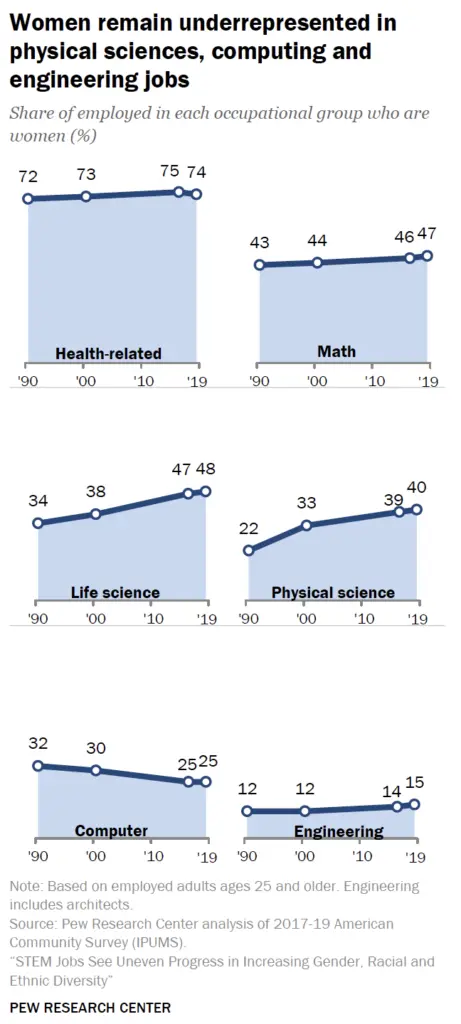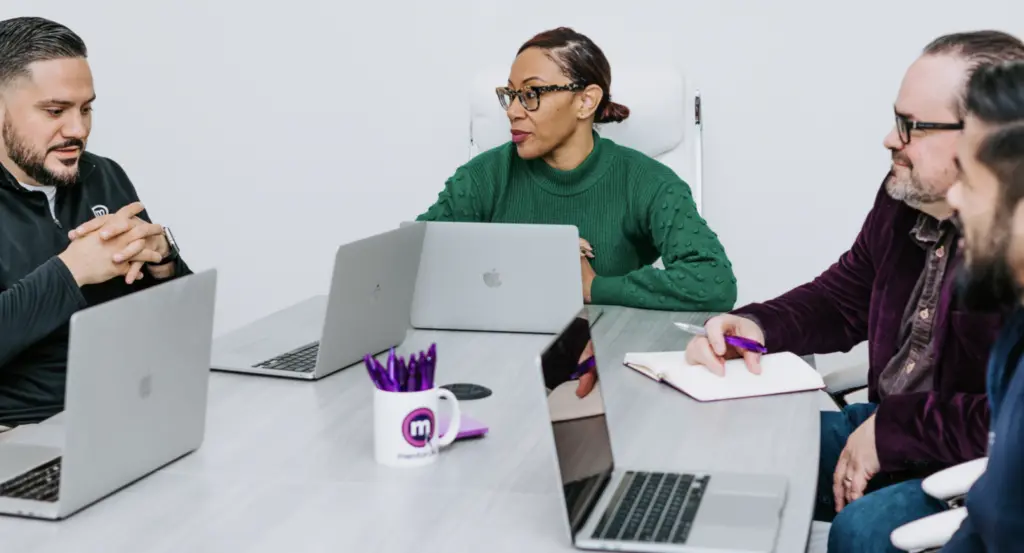ERGs (Employee Resource Groups) are distinct and safe spaces within the workplace for individuals who share similar backgrounds or experiences. While ERGs can serve a large number of needs and interests, most are designed for employees from historically underrepresented groups. This includes, but is not limited to workers who identify as women, Black, Hispanic, AANHPIs (Asian American, Native Hawaiian, and Pacific Islanders), or LGBTQIA+.
ERGs tend to serve a large number of important functions, including operating as mentoring incubators, ensuring the right voices are being heard when they speak, and simply helping participants feel a little less alone in their workplace.
A common (although incorrect) assumption is that ERGs are exclusionary. Most ERGs, however, make space for dedicated allies. ERG leaders have long recognized the value of having allies who are willing to support their efforts. That said, many people who hope to step into this important role have limited or no training on how to be an ally to those who identify as BIPOC (Black, Indigenous, People of Color) or from other underrepresented or marginalized groups.
This guide will help you understand what it means to be an ally and how to go about the process, but it will also arm you with the right insights and strategies to help others succeed in allyship as well, particularly within a professional working environment.
What Is an Ally?
An ally is someone who chooses to support an underrepresented group despite not belonging to that group themselves. They work to open doors to their colleagues from underrepresented groups and recognize the many systematic and intrinsic benefits and advantages that they themselves may enjoy. Allies work to correct these wrongs by leveraging those advantages they have that others may not have.
It is made all the clearer by looking at synonyms, such as backer, supporter, partner, and sympathizer, to name just a few. This is someone who is here to help, not for glory or recognition but because it is simply the right thing to do.
Thinking more broadly about allyship

The term “allyship” is, at times, more narrowly defined as those who provide support to individuals from within the LGBTQIA+ community. This group, in particular, faces unique and difficult hardships in the workplace, making allies all the more necessary.
Nevertheless, it’s important to think more broadly about allyship, especially as it relates to specific fields and industries where representation remains low.
Take STEM fields, for example. PEW Research found that between 1990 and 2019, the percent of women employed in computing jobs decreased by 21%, while women also remain considerably underrepresented in engineering roles with just 15% of workers in that industry identifying as women as of that time.
Meanwhile:
- 54% of Black women say they are often “Onlys,” in that they are the only Black person or one of the only Black people in the room at work.
- Asian women are 7x more likely than white women and men to be mistaken as someone else of the same race and ethnicity.
This is just the tip of the iceberg, so to speak. Marginalization at work covers a wide swatch, and while it’s possible for almost anyone to feel left out, there are real, historic, and systematic issues that still persist for people from different groups within the workplace.
Allies can work to recognize those within these groups and make sure they are heard when they have to be in rooms alongside those whose cultural advantages might have helped them gain a seat at the table. Choosing to become an ally shows your commitment to creating diverse and equitable workplaces.
The hard work that ERGs do to amplify minority voices and champion diverse working practices should not be the only effort put into creating an inclusive workplace. Allies play an incredibly important role in diversity efforts and in making sure colleagues from different backgrounds and affinity groups feel welcome at work.
Why Do We Need Allies in the Workplace?
Within the framework of an ERG, allies can be most effective by helping leaders and participants accomplish their goals. If leaders need support starting an ERG, expanding the group, getting funding, or other areas where executive approval may be needed, consideration is often given more weight when non-members add their voices in agreement and also call for change, especially if the proposal doesn’t necessarily benefit them.
For example, a neurodiverse ERG might request the introduction of quiet zones within an office space. We all know how loud an office can get during busy hours. With more companies switching to hybrid-remote arrangements, employees who need this type of quiet environment will find this all the more necessary to succeed. Employees with sensory sensitivities might prefer a quiet space where they can work with reduced distractions and greater efficiency.
A neurotypical ally should support this motion; they can see the value in having these quiet spaces available for all, and they want to create an inclusive workplace where their neurodiverse colleague can flourish. Whether the ally is a peer or in leadership, they should actively step forward to uplift the request of the ERG.
How to Be a Better Ally in the Workplace
Being a better ally in the workplace is an active choice. It can require you to support colleagues when it would be easier to stay quiet, and you might need to closely examine some of your own opinions—especially opinions you might have held for years.
It can be hard work, but choosing to support underrepresented groups is a must in the modern workplace. Let’s take a look at some of the behaviors you and other allies should choose to exhibit.
Say it
First, you must declare yourself as an ally. The extent of this might be informed by those around you. Writer Jamie Paul articulates it well in his article about quiet activism:
“No one wants to be smothered, loomed over or pressured. People can smell fanaticism and desperation from a mile away.”
Supporting minorities is not about you. Declaring yourself an ally signifies that you can offer marginalized colleagues a safe space within the company, but that doesn’t mean that you can loudly draw attention to yourself and expect pats on the back for a job well done.
Leave assumptions at the door
In 2012, Nigerian-American writer and art historical Teju Cole penned an article in The Atllantic titled, “The White Savior Industrial Complex”. The subtitle? “If we are going to interfere in the lives of others, a little due diligence is a minimum requirement.”
In his article, Cole offers a response to those who, in general, have all the good intentions in the world when trying to be allies:
“All he sees is need, and he sees no need to reason out the need for the need.”
As cole implies here, seeing the need to be an ally is important. But in doing so, it’s essential that you look past the surface. Don’t assume you understand why your colleagues need an ally. Ask them why they need that ally in the first place, and the offer your support based on the direction they give, instead of the direction you think they need.

Being an ally requires you to leave any assumptions and preconceived notions at the door. Even now, many harmful stereotypes perpetuate organizations and make it harder for underrepresented groups just to exist, never mind contributing new ideas or initiatives in their place of work.
If a colleague confides in you, do not assume that it’s general information that can be shared with your other coworkers. For example, a colleague may feel comfortable enough in your company to share their sexual orientation with you. However, they are not out to the rest of the team, and you should not assume as such.
Know the appropriate questions to ask
Asking questions is only natural. We want to know more about one another, and with that comes a need to ask questions and learn. However, that doesn’t mean that we should be free to ask anything that we want. Some questions are appropriate and help to create an inclusive company culture. Others are invasive and are often considered to be micro-aggressions. We want to ask the first and call out the second when we hear them.
An appropriate question might be: “Which pronouns do you use?”
It shows that you are respectful of other people’s identities and self-expression. Even if you are cis-gendered, expressing your pronouns during the introduction of a meeting or interview can immediately signal that this is a safe space.
An inappropriate question might be: “Where did you learn such good English?”
Asking this creates a situation where the person is being Othered, and can imply the person speaks English much more articulately than other people from their ethnicity, culture, or race; thus suggesting their ethnicity, culture, or race is inferior for not being able to do so.
A real-life example of this occurred during the 2008 presidential election cycle. In speaking about and complimenting Barack Obama, Biden made what Time Magazine termed “A Dubious Compliment“:
“I mean, you got the first mainstream African-American who is articulate and bright and clean and a nice-looking guy. I mean, that’s a storybook, man.”
It wa s a comment that left enough doubt to raise questions about racism and led to Biden apologizing for the gaffe. As CBS News reported at the time, “Biden told reporters that he’d used the word “clean” to describe Obama as “fresh and new,” and that the choice of words was not meant to disparage other black candidates who’d run for president in the past, such as civil rights leaders Jesse Jackson and Al Sharpton.”
Curiosity about someone’s background is understandable, but make sure that you always ask questions respectfully and speak of them in a way that doesn’t do harm to them or yourself. Focus on the person and their lived experiences, not their culture or appearance. Remember, no one is obliged to give you an answer, and if they choose not to respond, then you should let the matter go.
Learn to listen
You might think that you are a good listener, but are you willing to hear everything thrown at you? Part of becoming a good ally to ERGs and marginalized people is being confronted with constructive criticism and uncomfortable truths. It is important to listen to the experiences of colleagues from different backgrounds.
Practice active listening, and ensure that you listen to what they are actually saying as opposed to what you want to hear. “Interpreting” marginalized voices and rephrasing what they are saying is harmful and suppressive. We must encourage authenticity and unfiltered thought, but that comes only from listening to minorities.
Amplify marginalized voices
A big part of being an ally is not to speak over marginalized voices in a conversation but to, instead, uplift and amplify them. Use those listening skills to hear what minorities are saying and work together to put it into action. It is far too easy to slip into performative allyship. This is inauthentic and often promotes and praises the actions of the so-called allies rather than those who actually require support.
Instead, create systematic change within your company that promotes minorities. Look to your recruitment practices, appoint a Chief Diversity Officer if you don’t yet have one, and set up mentoring to nurture your leaders of tomorrow. All of these will help to provide clear paths for marginalized employees to follow. Celebrating events like Black History Month or National Inclusion Week are great starts, but if no real change is brought to the organization, then they just look like corporate tokenism rather than true inclusion.
Educate yourself
The burden and responsibility of teaching the majority is not on marginalized groups. Using the excuse of “Well, no one ever told me!” simply isn’t good enough with as much social, cultural, and historical context underpinning our engagements these days.
There are many books, documentaries, podcasts, and more discussing viewpoints and opinions from all corners of humanity. In the age of the internet, it is easier than ever to research and find out any information you wish to know.
Take it upon yourself to do the research and find trustworthy sources to listen to. TED talks are a great place to start, but there is a real wealth of information out there if you are only willing to work hard and find it yourself.
Accept your mistakes
An ally will make mistakes. You may have some acts in your past that you are not proud of — unintentional or ignorant but still harmful — or you could make a mistake in the present as you try to navigate what it means to be an ally.
What matters is that you acknowledge the mistake and the harm that you have caused and that you sincerely apologize. Demonstrate your willingness to learn from your mistakes and the actions you intend to take to educate yourself on the matter. The person or group you have offended do not have to accept your apology, but they will most likely appreciate that you made one and that you are taking genuine steps towards change.
3 Acts of Allyship to Support ERGs
What are three acts of allyship that you can bring to your workplace to support ERGs? They are simpler than you might think:
1. Speak up
First, you need to commit to speaking up. Call out injustices or mistreatment when you see them occurring. Support proposals put forward by ERGs and encourage new employees to join one. Be an advocate for them and show them that their perspective matters, no matter how junior their role might be.
2. Extend opportunities
Ensure that ERGs have a seat at the table for important company discussions. Pass the mic to them wherever possible so that they have the opportunity to voice their concerns themselves rather than through you as a mouthpiece. Give them access to learning and development opportunities, new networks and connections, and other experiences and relationships that are just an expectation for the majority.
3. Challenge the status quo
Just because the company has always done things one way does not mean there should never be scope to change.
If the majority of the board is white men, an ally could advocate for the appointment of more women, and BIPOC women on top of that.
If the current work-from-home policy only provides the bare minimum to disabled employees, an ally could work with them to improve it and make it more inclusive.
If the office dress code is strictly gendered — mandating suits for men and skirts and heels for women — an ally could speak with LGBTQ+ and non-gender-conforming colleagues about the best steps for the introduction of a more expressive and gender-neutral dress policy.
Become an ally and support your ERGs
We all deserve to live in a world where inclusive workplaces and fair standards for all are the norm. Unfortunately, though great progress has been and still is being made, we still have a long way to go.
Allies will play a vital role in the acceptance and normalization of marginalized experiences in the workplace. You can start today by creating and supporting ERGs in your company to help boost diversity, equity, and inclusion efforts.
ERG software can help cut down on the paperwork and bureaucracy required by this initiative and centralize information and discussions, placing everything in one easy location for employees to find. By setting up ERGs for success from the start, allies can assist their colleagues in helping to create better workplaces where we all can thrive.
Book a demo today to see CommunityCliQ software in action!




